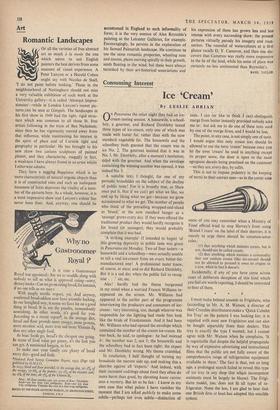Consuming Interest
Ice 'Cream'
By LESLIE ADRIAN N Panorama the other night they had an ice- cream tasting session. A housewife, a school- boy, a gourmet, and Richard Dimbleby tasted three types of ice-cream, only one of which was made with butter fat, rather than with the now standard vegetable fat. The housewife and the schoolboy both guessed that the cream was in ice No. 2. The gourmet insisted that it was in No.3. Mr. Dimbleby, after a moment's hesitation, sided with the gourmet. And when the envelope containing the winning number was opened, it was indeed No. 3.
A suitable text, I thought, for one of my periodic broadsides on the subject of the decline of public taste! For it is broadly true, as Shaw once put it, that if we can't get what we like, we end up by liking what we get—because we grow accustomed to what we get. The number of people who think of the prevailing wrapped-and-sliced as 'bread,' or the now standard banger as a `sausage' grows every day. If they were offered the traditional product they would hardly recognise it for bread (or sausages); they would probably complain that it was bad.
`A striking example' (I intended to begin) `of this growing depravity in public taste was given in Panorama on Monday. Two of four tasters—a housewife and a schoolboy—were actually unable to tell a real ice-cream from an ersatz butter-fat- manufactured one ! A professional taster knew, of course, at once; and so did Richard Dimbleby. But it is a sad day when the public fail to recog- nise . . .' etc. etc.
Alas! hardly had the theme burgeoned in my mind when a worried Francis Williams re- appeared on the screen. Mr. Williams had appeared in the earlier part of the programme interviewing the producers and consumers of ice- cream : very interesting, too, though whoever was 'responsible for the lighting had made him look like the bride of Frankenstein. And it had been Mr. Williams who had opened the envelope which contained the number of the cream ice-cream. He was back, he said, to apologise : he had misread it : the number was 2, not 3; the housewife and the schoolboy had in fact been right; the expert and Mr. Dimbleby wrong. My theme crumbled.
In retaliation, I half thought of turning my broadside the narrow side up, and making this a diatribe against all 'experts.' And indeed, with their incessant codology about food they often do more harm than good, by elevating haute cuisine into a mystery. But let us be fair : I know in my own case that what palate I have vanishes the moment that I am asked publicly to make some subtle—perhaps not even subtle—distinction of taste. I can (or like to think I can) .ffistinguish marge from butter instantly provided nobody asks me to : but ask me to do one of these tests used by one of the marge firms, and I would be lost.
The point, in any case, is not simply one of taste. I would argue that only cream ices should be allowed to use the term `cream' because once you let the term 'cream' be used in anything except its proper sense, the door is open to the most egregious deceits being practised on the customer —as they are, every day, by cafés.
This is not to impose pedantry in the keeping of terms to their correct uses—as in the comic case some of you may remember when a Ministry of Food official tried to stop Harvey's from using 'Bristol Cream' on the label of their sherries; it is merely to urge there should be common-sense rules : 11) that anything which imitates cream, but is not, should not be called cream;
(2) that anything which imitates a commodity that can contain cream (like ice-cream) should not be allowed to pretend it owes its origins to a cow, when in fact it doesn't.
Incidentally, if any of you have come across cases of deliberate deception of this kind which you feel are worth reporting, I should be interested to hear of them.
I must make belated amends to Frigidaire, who (according to Mr. A. M. Watson, a director of their Croydon distributors) make a 'Quick Cubelet Ice Tray' on the pattern I was looking for; it is supplied with most new Frigidaires and can also be bought separately from their dealers. This tray is exactly the type I wanted; but I cannot agree with Mr. Watson when he complains, 'It is regrettable that despite the helpful propaganda by way of expensive advertising and instructional films that the public are not fully aware of the comprehensive range of refrigeration equipment available to them.' The fact is that, not so long ago, a prolonged search failed to reveal this type of ice tray in any shop (for which incompetent assistants must be largely to blame). The Frigi- daire model, too, does not fit all types of re- frigerator. None the less, I am glad to hear that one British firm at least has adopted this sensible system.


































 Previous page
Previous page